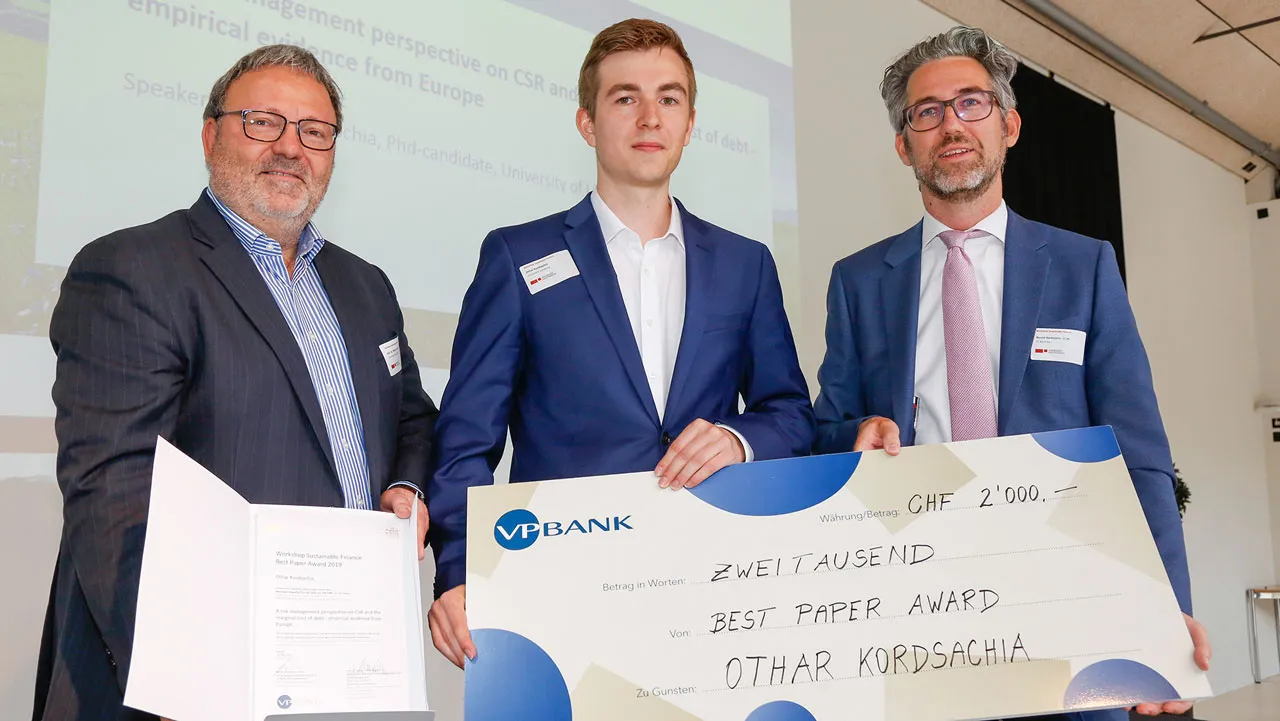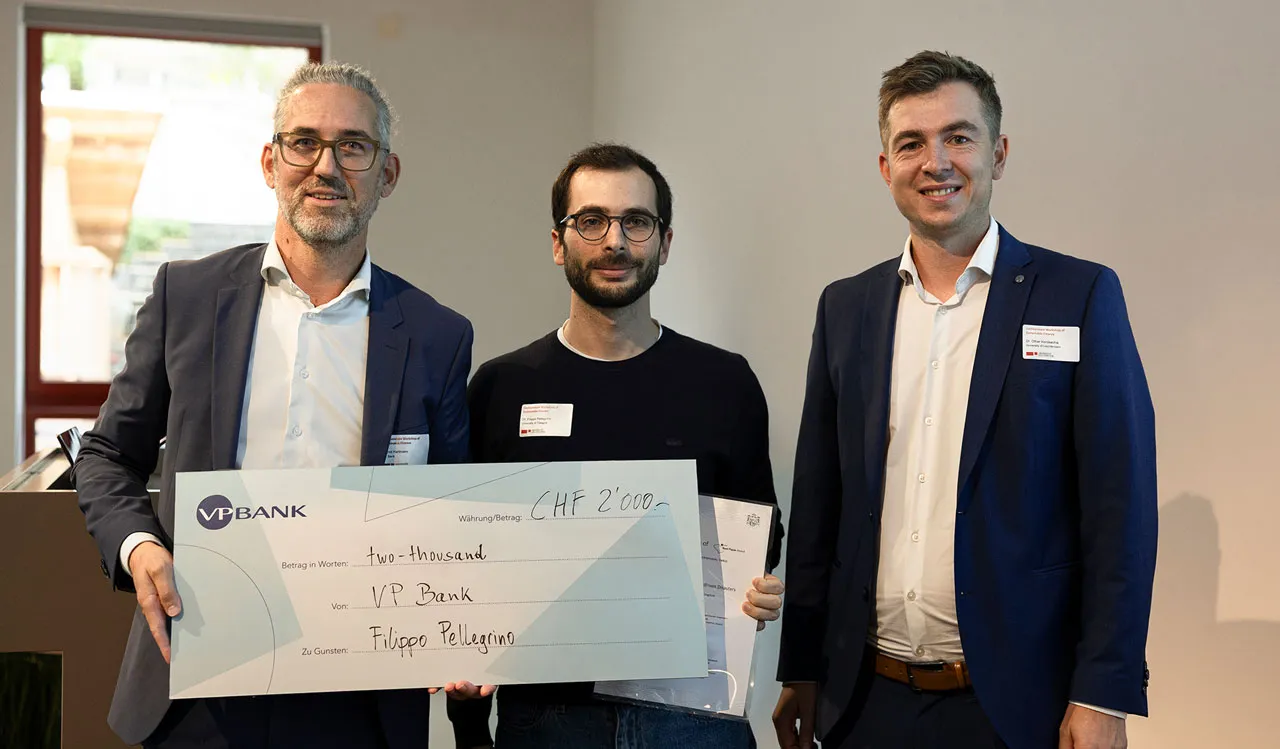VP Bank presents the Best Paper Award
Together with representatives of VP Bank, the findings of the best six papers submitted were presented yesterday and subsequently discussed.
The best paper received the "VP Bank Best Paper Award". The prize went to the paper entitled "A risk management perspective on CSR and the marginal cost of debt - empirical evidence from Europe", written by Othar Kordsachia (University of Lüneburg).

The paper examines how the European bond market rewards sustainability. In contrast to equities, this is an even less researched area. The author was able to show that companies with a stronger focus on sustainability bear lower financing costs. Thus, there are incentives to improve their own sustainability. This applies primarily to financially troubled debtors, as the work could prove. VP Bank warmly congratulates the authors on this award.
Interview with Othar Kordsachia
Research Assistant at the Faculty of Economics and Business Administration
Institute of Finance and Accounting, Chair of Accounting & Auditing
Leuphana University Lüneburg (Germany)
Laureate of the VP Bank Best Paper Award, which was presented at the 3rd "Sustainable Finance" workshop of the University of Liechtenstein in May 2019.
In his work, Othar Kordsachia examines the question of whether a company with a high sustainability rating can obtain additional debt capital at a lower cost. The author evaluates data from around 800 European companies included in Thomson Reuters' corporate and social responsibility rating database (ASSET4) and in part in the Dow Jones Sustainability index. This is about the impact of the increasingly important ESG criteria for investors, which assess a company's environmental, social and managerial behaviour.
Mr. Kordsachia, congratulations on this award. You come to the conclusion that the additional borrowing is cheaper for sustainable companies. By how much?
I have differentiated between debt capital as a whole and long-term debt. The effect is 40 basis points or 50 basis points for a long-term loan.
How did you compare the credit costs of different companies?
I am talking about implicit credit costs based on various criteria that show how well the company is doing. I have also included analyst estimates and evaluated texts published by the company itself, such as annual reports, which relate to price and risk.
Does your evaluation mean that companies with a good sustainability rating have a healthier business model?
In research there is an opinion that this works like an insurance policy. And if the company isn't doing well, this sustainability insurance comes into play. There is greater trust in the company.
So thanks to the sustainability rating, investors have the feeling that a company is in a better position than pure financial analysis would show?
Yes, sustainability is regarded as an additional risk factor.
Are the credit costs of sustainable companies always lower or only if things are going badly in the company?
In my work I demonstrated that the sustainability rating plays an even greater role at the very time of a crisis.
But then this is exactly the most sensitive time to increase debt?
That's true in theory, but in practice it's often unavoidable.
According to your work, investors accept a lower return. Why would they do that?
The assumption is that investors are looking at the sustainability rating and therefore assess the risk less. ESG risks can have a financial impact. A classic example is the scandal at Volkswagen.
How do you mean that?
I mean, the example of exhaust gas manipulation shows that perhaps too little has been invested in innovation. That can be measured and something like that stands out in the sustainability grid. Such things also have a negative impact on financial ratios in the long term.
The issue of sustainability and climate change is being driven by institutional investors - insurance companies and pension funds, some of whom are being pushed in this direction by politicians. Couldn't the effect you are proving be due to a temporary excess demand?
That is an exciting theory. But empirically it is very difficult to prove where the individual reasons lie. But what you can see is that sustainability criteria are becoming increasingly important in a risk management system. This is reflected in the stock prices. However, if these risks were not significant, it would not be possible to measure this deviation. If one assumes that markets are efficient, political opinions should have no influence without appropriate regulatory changes.
What about the number of sustainability ratings?
The focus is growing and it is becoming easier to get such ratings. They are becoming more and more popular, and the financial portal Yahoo Finance is now also making such ratings available to private investors.
How can your work be used in research and what other questions should be answered?
In the future, it will be more important not to look at the aggregated rating, but to filter out those variables among the numerous individual variables that are decisive. This cannot be determined in a study alone. Companies are currently publishing information on their CO2 emissions, which could, for example, be a relevant variable for investors.
And for you personally, how does the price help you?
At the moment I am a doctoral candidate and I wrote this study as part of my doctoral thesis. The award is important for this, it encourages me. I like the academic work and I can well imagine staying at the university after my dissertation.
How will you use the money?
The trophy money will help me. Soon I will be going to a conference in Lisbon, where I will have to finance part of it myself. I also paid for this trip to Liechtenstein myself.
When will your dissertation be finished?
I hope in one to two years.


